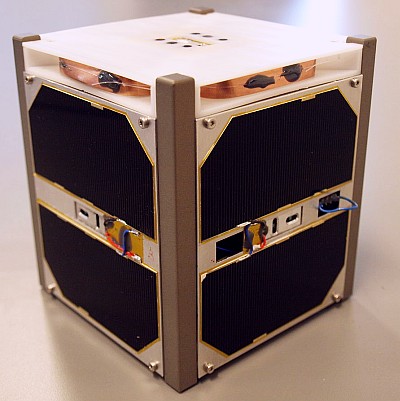Aalborg University Denmark

AAUSAT3 is the third CubeSat built and operated by students from Aalborg University in Denmark. It will be launched from Satish Dhawan Space Centre in India on a PSLV-20 rocket. AAUSAT3 carries two AIS receivers as the main payload. Main test area will be around Greenland due to the low density of ships and the cooperation with our main sponsor Danish Maritime Authority. AAUSAT3 will – hopefully – be capable of receiving AIS information and carry out on-line information analysis. Still the full AIS telegrams (the HDLC package) are stored on-board and can be downloaded. Partially damaged telegrams will be stored as well (given a number of restrictions/rules) for later repairing in the ground segment. So weak signals (like from SART equipment) may be receive-able by AAUSAT3.
NASA-Catalog: 39087
Downlink
437.425 MHz, (MSK 9k6, FM) und CW Bake
Call
OZ3CUB
Status
ACTIVE
Orbital Parameter
Inclination 98.471 RA of A. Node 245.161 Eccentricity 0.0004579 Argument of Perigee 356.252 Revs per day 14.32690253 Period 1h 40m 30s (100.50 min) Semi-major axis 7 161 km Perigee x Apogee 779 x 786 km BStar (drag term) -0.000011606 1/ER Mean anomaly 218.660
Telemetrie
CW Bake
OZ3CUB B x.x(battery voltage) T xx(temp)
The spacelink frames start with a variable length training sequence (default 60 bytes), followed by a 6 byte syncword („OZ3CUB“). The packet format supports two different packet lengths, either 25 or 86 bytes. A one byte Frame Size Marker (FSM) is used to differentiate between long and short packets. The FSM is 0xA6 for short frames and 0x59 for long frames.

Next, 31 or 92 bytes (short or long packets) of FEC coded data follows. After applying the FEC, the FEC data length is:
Short Frame: ((2 + 4 + 23 + 2) bytes [data] + 32 bytes [RS] + 1 byte [Conv. tail]) * 2 [Conv.] = 128 bytes
Long Frame: ((2 + 4 + 84 + 2) bytes [data] + 32 bytes [RS] + 1 byte [Conv. tail] * 2 [Conv.] = 250 bytes
